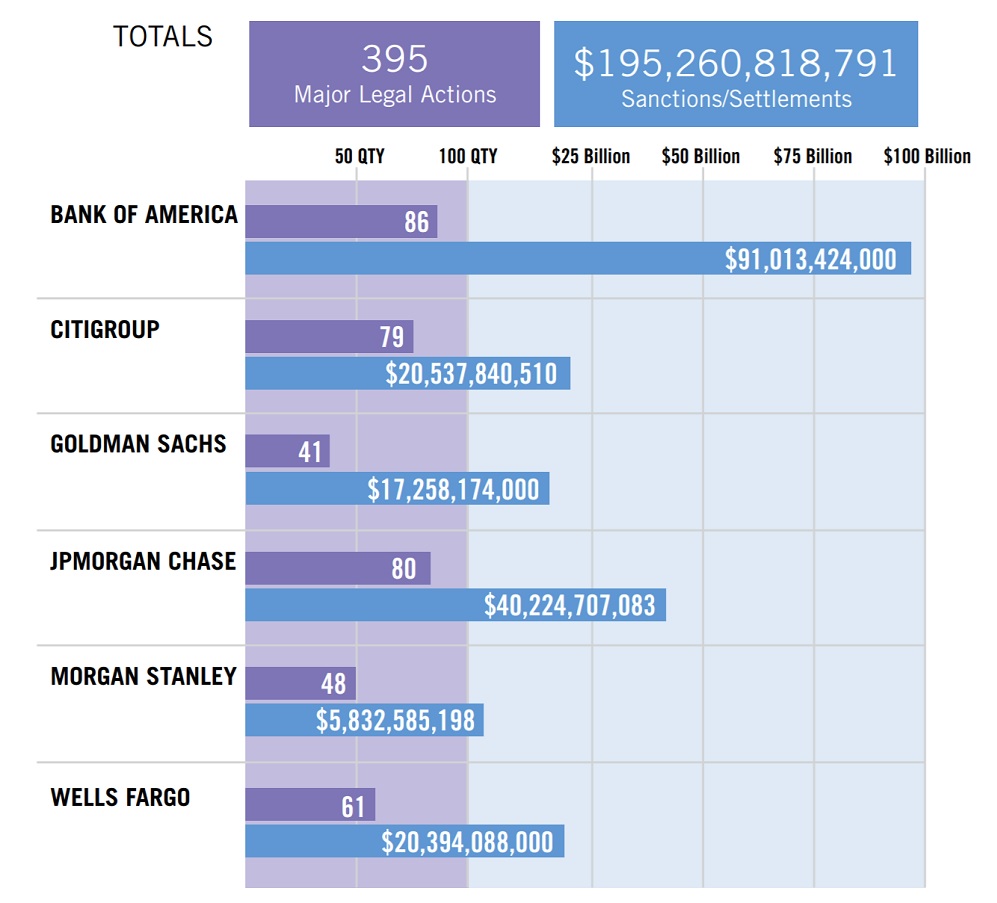Leading US banks have fined nearly $ 200 billion in fines and penalties for illegal activity in 395 major legal cases over the past 20 years. Bank of America tops the list, followed by JPMorgan, Citigroup and Wells Fargo. This emerges from a new report that also covers Morgan Stanley and Goldman Sachs.
Fines of $ 200 billion
Bank of America, Citigroup, Goldman Sachs, JP Morgan Chase, Morgan Stanley and Wells Fargo have totaled $ 195 billion in fees and fines, according to Washington-based advocacy group Better Markets. Fees and penalties from 395 major legal cases since 2000 have been paid to government agencies, investors and consumers harmed by bank behavior.
The report notes that “banks’ behavior is deteriorating because it detects their behavior as the financial crisis has triggered bigger legal action than their previous behavior,” said Dennis Kelleher, chief executive of Better Markets, on Thursday.
Between 2000 and the financial crisis, banks were hit by 85 serious legal complaints, the report said. There were 110 main cases during the financial crisis between 2008 and 2012. There were 204 legal actions against the banks between 2012 and today.
The number of key legal actions and sanctions or settlements against six major banks. Source: Report on Better Markets
The types of financial crime banks banks are involved in include money laundering, bribery, “massive fraud in the sale of mortgage-backed securities”, credit card and checking account misuse, and foreclosure and collection violations, the report said. Also included were fiduciary violations, antitrust violations, market manipulation, enabling Ponzi schemes and violations of the electoral law.
“These are all important legal steps,” Kelleher was quoted as saying. “It’s not like it was a ‘broken window’ theory after the crash, where prosecutors fined any minor injury.” The CEO of Beter Markets noted:
If they were subjected to higher standards, they would all have been out of business because the relapse is actually quite shocking.
He pointed to some examples of the cases that have occurred this year, showing that banks have repeated their mistakes in the past. While, in most cases, financial institutions generally do not admit or disapprove of wrongdoing, confessions of guilt have become more common.
In October, JPMorgan Chase was fined $ 920 million for allegedly tampering with the metals and treasury markets. The company “entered into a deferred law enforcement arrangement in 2014 after admitting anti-money laundering deficiencies in the context of Bernard Madoff’s Ponzi program and pleading guilty in 2015 on criminal charges of manipulation of the currency markets,” the report said. Kelleher said:
It is absolutely shocking that JPMorgan has now pleaded guilty to three separate criminal charges of outrageous years of criminal behavior.
Over the past 20 years, JPMorgan has raised $ 40 billion in 83 separate cases, of which approximately $ 10 billion is related to crisis-era activity at Bear Stearns and Washington Mutual, which it bought when they were in trouble in 2008 .
Bank of America paid $ 91 billion in 86 legal cases, the highest fees and penalties. Most of these concerned “mortgage-related problems that occurred before Bank of America acquired companies more than 10 years ago.” The report adds that $ 40 billion of the bank’s fines and penalties were tied to Countrywide, a mortgage lender the bank bought in 2008, and billions to Merrill Lynch, the broker it bought during the crisis.
In addition, Goldman Sachs recently paid settlements for its role in Malaysia’s 1MDB development fund.
What do you think of illegal activities and bank fines? Let us know in the comments below.
Photo credit: Shutterstock, Pixabay, Wiki Commons, Better Markets
Disclaimer of liability: This article is for informational purposes only. It is not a direct offer or an invitation to submit an offer to buy or sell, or a recommendation or approval of products, services or companies. Bitcoin.com does not provide investment, tax, legal, or accounting advice. Neither the company nor the author are directly or indirectly responsible for any damage or loss caused or allegedly caused by or in connection with the use of or reliance on any content, goods or services mentioned in this article.

